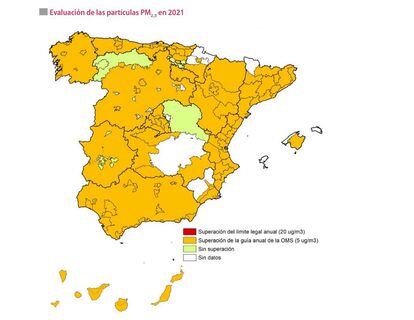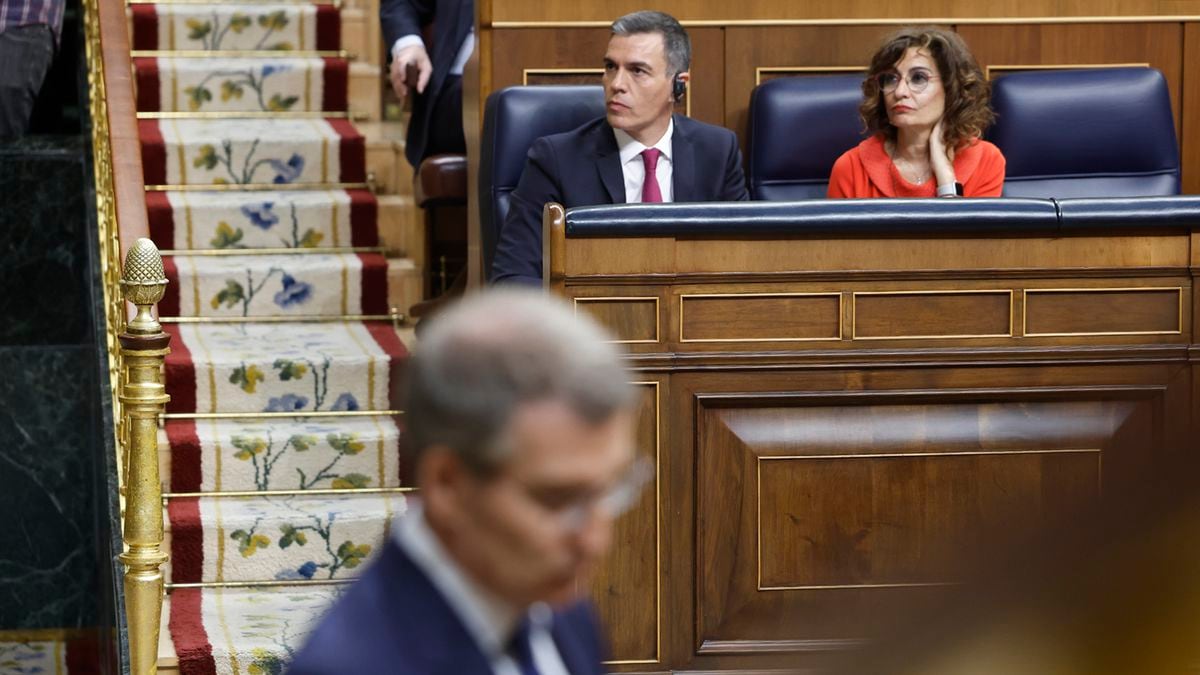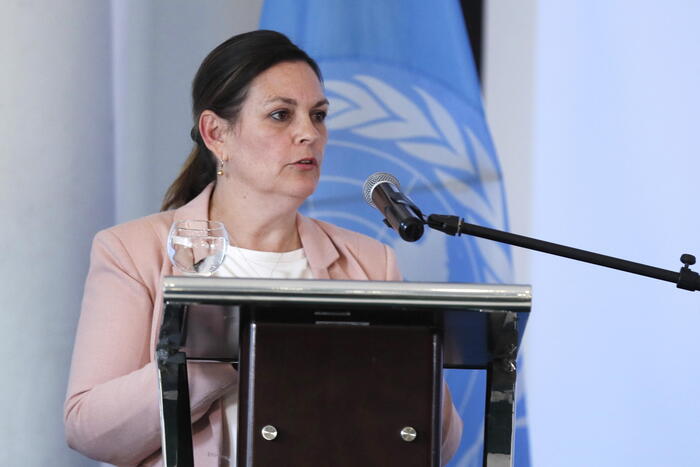The Madrid pollution beret, last February. Jesús Hellín (Europa Press)
The reduction in mobility caused by the pandemic in 2020 has continued in 2021, which has translated into better air quality in Spain.
The equation of less traffic, less pollution is fulfilled.
In fact, pollution is at its lowest level since 1990. Despite this improvement, the majority of the population has continued to suffer from levels of pollution that the World Health Organization (WHO) considers dangerous.
This is confirmed by a report by Ecologists in Action presented this Monday and based on data from almost 800 official measurement stations.
“Not even a pandemic has allowed us to enjoy clean air to prevent damage to people's health.
Greater efforts must be made to reduce motorized traffic in cities and to replace dirty energies with clean ones”,
The document analyzes the state of the main pollutants in the last year: suspended particles (PM₂,₅ and PM₁₀), nitrogen dioxide (NO₂) and tropospheric ozone (O3), in addition to sulfur dioxide (SO₂).
And it takes into account, on the one hand, the legal limits established by the European Union and, on the other, those established last September by the WHO, which are much more restrictive.
For example, if the EU allows an annual exposure of 40 micrograms per cubic meter of NO₂, the WHO considers that it is not healthy to exceed 10. Something similar happens with particles, where the UN organization has also recommended reducing by half the maximum recommended annual exposure.
More information
What air do the children of Madrid and Barcelona breathe?
In 46% of schools the permitted contamination is exceeded
With the WHO thresholds, based on scientific knowledge, 98% of the Spanish population breathed in 2021 air with pollution levels higher than those recommended.
The most widespread contaminant is PM₂,₅ and PM₁₀ particles, associated with car smoke but also with tire wear and industrial activity, and also with episodes of Saharan dust (which usually affects the Canary Islands).
And this despite the fact that "the measurement and evaluation of PM₂,₅ particles is still insufficient in most regional measurement networks", according to the environmental organization.
However, if the legal limit is taken as the threshold, no region has exceeded it this year.
Evaluation of PM2.5 particles in 2021 Source: Air quality in the Spanish State during 2021
As for nitrogen dioxide (NO₂), the levels plummeted in 2021 by 25% compared to the average level between 2012 and 2019 due to the reduction in urban traffic.
Despite this, several areas of the Community of Madrid, Catalonia, Andalusia, the Valencian Community and the Basque Country have exceeded the levels recommended by the WHO.
In fact, Madrid has even exceeded the legal limits of the EU, much more lax, for which a European fine hangs over the Madrid authorities.
Tropospheric ozone is added to both substances, which affects almost the entire territory and is also partly associated with vehicle traffic.
Evaluation of nitrogen dioxide (NO2) in Spain in 2021 Source: Air quality in the Spanish State during 2021
If we stay with the legal limits, and according to the NGO's estimates, the polluted air reached 5.4 million people, that is, 11.3% of the entire population.
Of course, this situation represents a decrease of 7.1 million people affected compared to 2019 and more than 10 million people compared to 2017 and previous years, being the lowest figure since the approval and entry into force of the aforementioned regulations .
Good practices against pollution
“The paradox of 2021 is that having the lowest levels of air pollution since there are records, as happened in 2020, the entire population has been exposed to levels of pollution much higher than that recommended by the WHO.
In other words, the improvement has been clear, but insufficient”, says Ceballos.
“With the reduction in pollution that we have seen during the pandemic, we have to be clear that we can carry out our daily lives with fewer polluting emissions based on good practices such as teleworking, local purchases and the reduction of unnecessary car trips.
And we must promote active mobility (by bike and on foot) and public transport, but for this it is essential that the authorities provide citizens with alternative means to the private vehicle.
We have not yet managed to recover pre-pandemic public transport passengers.
And without strong, comfortable and well-funded public transport it is going to be difficult to maintain improvements in air quality”, he continues.
The expert points out that the European Commission is in the process of updating the permitted limits, a decision that is expected next year, with which many territories that now comply with the standard will become outlawed: "Even with the current limits, which are very lax, Madrid and Barcelona are already on the way to exceeding the legal levels of pollutants, and that causes us great concern, because the situation is going to get worse with the increase in traffic”.
Ceballos is committed to the creation of low emission zones in all large Spanish cities, as required by the climate change law in 2022. “The pre-election situation is delaying its implementation.
Maybe 2022 will end and they are not implanted.
But they must be ambitious and reduce the number of vehicles, because if not, they will be useless”.
You can follow CLIMA Y MEDIO AMBIENTE on
and
, or sign up here to receive
our weekly newsletter



/cloudfront-eu-central-1.images.arcpublishing.com/prisa/QTVF3EOGLFBTPJL3YXHGH4CEFE.jpg)











